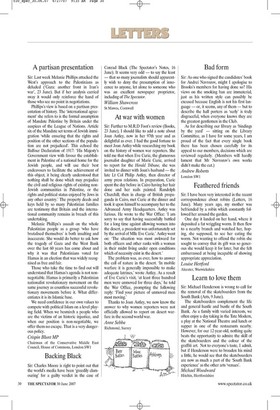At war with women
Sir: Further to M.R.D Foot's review (Books, 23 June), I should like to add a note about Joan Astley, now in her 97th year and as delightful as ever. I had the good fortune to meet Joan Astley while researching my book on the history of women war reporters. She told me that when Eve Curie, the glamorous journalist daughter of Marie Curie, arrived to report for the Herald Tribune, she was invited to dinner with Joan's husband — the late Lt Col Philip Astley, then director of army press relations. In preparation, Curie spent the day before in Cairo having her hair done and her nails painted. Randolph Churchill, then in charge of British propaganda in Cairo, met Curie at the dinner and took it upon himself to accompany her to the Advanced Army Headquarters. Astley was furious. He wrote to the War Office: 'I am sorry to say that having successfully battled for a long time against allowing women into the desert, a precedent was unfortunately set by the arrival of Mlle Eve Curie.' Astley went on: 'The situation was most awkward for both officers and other ranks with a woman in their midst living under open conditions which of necessity exist in the desert.'
The problem was, as ever, how to answer the call of nature in the desert. 'In mobile warfare it is generally impossible to make adequate latrines,' wrote Astley. As a result of Eve Curie's visit, 'at least three hundred men were unmoved for three days,' he told the War Office, prompting the following reply: 'Find your picture of unmoved men most moving.'
Thanks to Joan Astley, we now know the answer to why women reporters were not officially allowed to report on desert warfare in the second world war.
Anne Sebba Richmond, Surrey


















































































 Previous page
Previous page